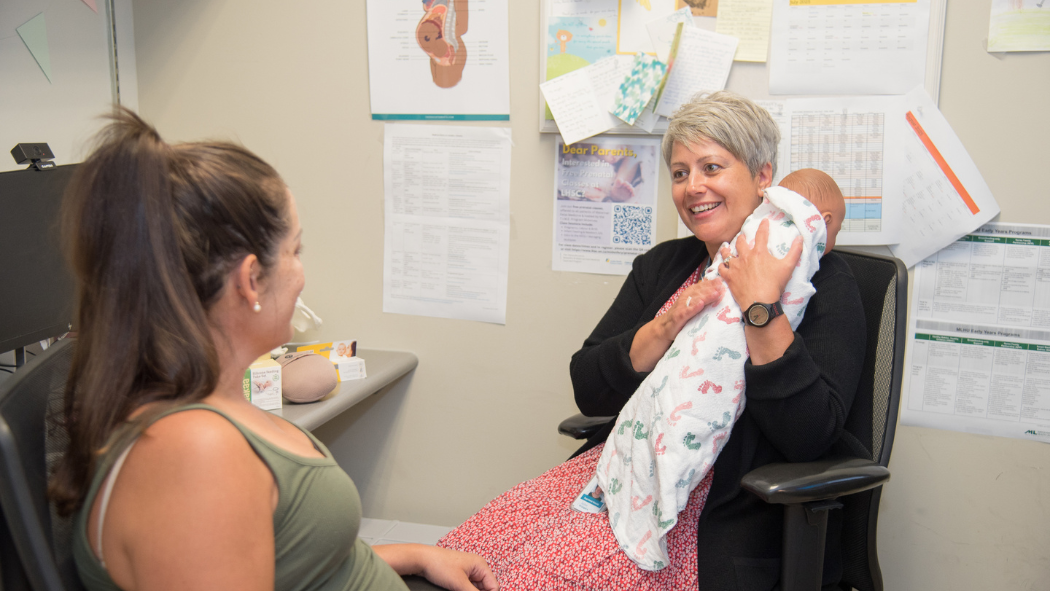
Pictured: Midwife Jackie Droogers demonstrates infant feeding and burping techniques for an expectant mother.
July 28, 2025
Expecting a baby can be both exciting and overwhelming, particularly for families navigating a high-risk pregnancy. To better support these patients, London Health Sciences Centre (LHSC) has launched a new suite of online prenatal education modules tailored to their unique needs.
The initiative, a collaboration between LHSC’s T.I.M.E. (The Interprofessional Midwifery/Maternal-Fetal-Medicine Expanded) program midwives and students from Western University’s master of interdisciplinary medical sciences program, aims to fill a longstanding gap.
“Most prenatal education programs are designed with low-risk pregnancies in mind,” says Jackie Droogers, midwife at LHSC. “We wanted to ensure that patients experiencing higher-risk pregnancies aren’t left behind when it comes to accurate, accessible information.”
Topics tailored to real-life scenarios
The modules cover key topics like pregnancy and birth, newborn care, managing multiples, infant feeding, the postpartum period, support from the Neonatal Intensive Care Unit (NICU) and considerations for 2SLGBTQIA+ families. Each topic is designed to reflect the realities of high-risk pregnancies, including the possibility of preterm births and c-sections.
“Patients can choose the modules that are most relevant to them,” explains Droogers. “They’re optional and flexible, allowing patients and their caregivers to learn at their own pace and revisit the material as needed.”
Droogers sees the modules as an opportunity to learn in a calm, controlled environment that is outside of a traditional clinical setting, which she admits can be intimidating. This approach, she says, is key to helping patients absorb information in a way that feels more manageable and less overwhelming.
Meeting patients where they’re at
As one of the largest single-site birthing units in Canada, LHSC provides care not only to families in London and the surrounding region, but also to high-risk patients referred from across the province. The new online modules were developed with this in mind.
Many patients live outside the city, making travel to in-person prenatal classes inconvenient or costly, while others juggle busy work and family schedules that make it difficult to attend sessions at set times. For some, learning from home simply offers greater comfort and flexibility.
To ensure all patients receive the same high-quality information, Droogers says the modules were created to closely mirror the content of LHSC’s in-person prenatal classes. This gives families the freedom to choose the format that best fits their learning style and lifestyle.
“Whether you prefer a group setting or learning independently, the goal is the same: to prepare you for what’s ahead,” she explains.
A trusted foundation
While the modules were designed for patients under the care of an LHSC maternal-fetal medicine specialist, they aren’t intended to be substitutes for personalized medical advice.
“We encourage patients to bring any questions back to their care providers,” Droogers emphasizes. “The modules are a starting point; a way to get them thinking about what they need to know. But everyone’s situation is different.”
So far, patient feedback on the modules has been overwhelmingly positive. Many describe them as helpful, informative and practical.
“It’s really special to be able to offer this kind of support,” says Droogers. “When patients are armed with knowledge, they feel empowered to become active participants in their own care, which we know is key to having a positive birth experience.”